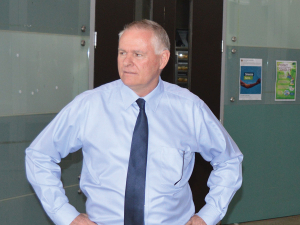The latest GlobalDairyTrade results showed another move in the right direction and cause for cautious optimism, but “not time to pop the champagne yet”.
That reaction to the GlobalDairyTrade (GDT) overall price index lift of 10.9% at last week’s auction, with whole milk powder up 12.1%, from Rabobank agribusiness research analyst Emma Higgins, sums up the general reaction from the finance community. The latest result follows a 14.8% increase at the previous auction.
“While it’s great to see prices on the GDT bounce upwards over the past two events, global dairy market fundamentals are still out of balance,” Higgins told Dairy News.
“We are still awaiting the global supply taps to be turned off, particularly in Europe as farmers continue to expand production after having their shackles removed following the unwinding of the EU quotas.
“From a demand perspective, China is still whittling away excess inventory, while other importers outside China and Russia who have previously mopped up the oversupply appear to be stuffed to the rafters with inventory.
“The good news is that the mechanisms to move these market place fundamentals have been triggered. Overseas, farmers are beginning to feel the crunch of falling farmgate prices in key export regions, particularly in Ireland. This is significant as low farmgate prices are the first step towards slowing supply growth – much needed in a market still awash with milk.
“We are expecting a significant improvement in dairy prices by mid-2016 as the supply/demand fundamentals rebalance once excess stocks are whittled away and global production slows.”
David Jones, director and NZ head of agribusiness at PPB Advisory, says it’s good to get a positive shift in GDT early in the season.
But the major influences, with a slowing consumption of the emerging markets, lifting of the EU quota, China stockpile and Russia trade bans, make it difficult to gauge what is around the corner.
“All things being equal, two positive trades is a good start,” he told Dairy News. “As the US shifts from dairy to beef we should see a further strengthening of commodity prices. There is a positive shift, with Russia and China both coming back to market.
“We need to get back to that environment where demand is greater than supply, supported by a correction in commodity prices to a long-run average rather than the highs and lows as current.”
Nathan Penny, rural economist with ASB, says the first leg of the dairy price trifecta is nearing completion. Dairy market sentiment has turned and prices have mostly regained the losses incurred in July and August.
The second, more difficult, leg of the dairy price trifecta is a drop or a material slowing in NZ dairy supply.
With dairy farmers culling aggressively and a high risk of El Nino, the bank predicts a 1% production fall from last season.
But Penny says markets are yet to be convinced NZ production is slowing, and will prefer cold, hard data to forecasts.
Plan to Front-Foot
Farmers need to work with financiers and advisers to get a plan, even if it is not palatable, says Jones.
While it is good to see a positive shift in dairy prices, there is no doubt global markets are more volatile, he told Dairy News.
“It is essential for the industry to manage businesses with a view to a changing market, and ensure businesses are driving cash earnings,” he says. “The days of capital growth may well be beyond what is needed to correct cash deficits.”
Jones says his advice to farmers is to work closely with their financiers and advisers.
“Make sure there are no surprises. And build a plan to deal with issues at hand and for the next 24 months.
“Once the game plan is established and agreed, sometimes not palatable, at least each party knows what’s expected of them. Then business at hand can be the focus.”











